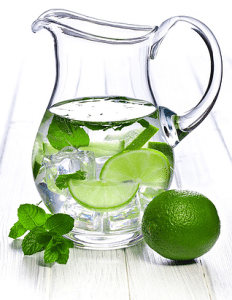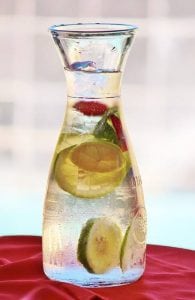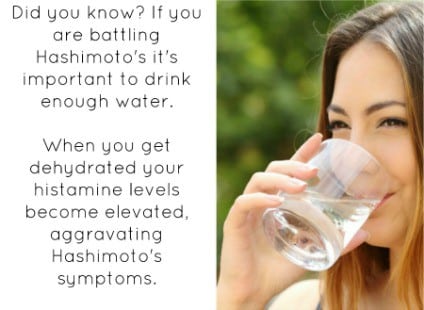You can survive for several days without food but going without water for just one day can have a major impact on your overall health. It’s easy throughout a hectic day to forget to drink water and many people don’t truly realize how important water and hydration is to sustaining health and life. Your body is actually 66% water and you lose water through sweat, elimination, and out-breath. If you don’t replenish your water stores you’ll notice the effects fairly quickly; however, you may not recognize the symptoms as being related to dehydration. Not only does dehydration negatively affect cardiovascular and other vital organ systems, it also affects your overall thyroid health.
Reasons You Should Drink Enough Water Every Day
Dehydration can cause
- Histamine level to rise aggravating symptoms related to thyroid disease and Hashimoto’s
Symptoms may include anxiety, dizziness, headaches and migraines, abnormal heart rate, high blood pressure, difficulty sleeping, nausea/vomiting, and difficulty regulating body temperature and many others. - Increased risk for blood clots and is of special concern for those with the MTHFR Gene SNP who are monitoring their homocysteine level
- Deficient fluid volume related to active fluid volume loss
Low fluid volume means tissues aren’t being optimally perfused with oxygenated blood. This can affect mental status, heart health, kidney function and more. - Alterations in red blood cell & plasma concentrations affecting circulating levels of thyroid hormone
Researchers found dehydrated states affected thyroid hormone levels but resolved after hydration. - Impaired, dried-out mucous membranes
This symptom is related to a decrease in saliva production and overall fluid deficit and is usually a sign of moderate dehydration. A dry mucous membrane increases the risk of infection and generalized poor health. - Fatigue, tiredness, joint pain and headache
When the tissues and cells are deprived of water the work of the cells and enzyme activity slows down. At this point, the cells cannot produce energy. This usually results in symptoms of feeling really tired, fatigued, and often results in low back, hip, knee or other joint pain and a mild low-grade headache. Fortunately, the body is resilient and as soon as water is replenished, these symptoms resolve rather quickly. - Weight Gain
Many people aren’t aware that a rumbling of the stomach is the body’s signal that it is thirsty due to mild dehydration. Most people assume it to be a sign of hunger and they turn to food for satisfaction. Instead, a couple cups of water is usually what the body is asking for to ease a “growling” stomach. Staying hydrated supports metabolism instead of being sluggish which can lead to weight gain. - Potential for stomach ulcers
This problem relates back to #5. The inner lining of the stomach is made up of millions of microscopic glands that secrete gastric juices. Beneath this is a supporting layer (submucosa) and then a muscle layer. Dehydration affects the integrity of the inner lining setting up the perfect environment for aggressive factors such as stomach acid damage to the defensive mechanism, i.e. the protective mucous lining. Too much acid eroding the lining can result in ulcers. Symptoms include heartburn, nausea and/or vomiting, upper abdominal pain or indigestion. - Constipation and Digestive Issues
The more water you drink, the less you retain. The less water you drink, the more you retain. With constipation, too much water is retained in the large intestine from your food waste. This results in discomfort and hard stools that are difficult to pass. Chronic constipation is a concern because it leads to toxic overload, bloating, abdominal pain and distress, irritable bowel syndrome, loss of appetite, nausea, and basically a sense of feeling unwell. - Compromised detoxification, body temperature regulation, and immune system
Referring back to #9, detoxification is a function the body does every day; however, it’s not possible to detoxify optimally in a state of dehydration. Regulation of body temperature also becomes a concern with dehydration because it is water that allows the body to release heat through sweat when the ambient temperature is higher than body temperature. It is the evaporation of water from the skin’s surface that cools the body. Dehydration compromises the immune systems ability to fight infection. When mucous membranes are dry and “sticky,” pathogens can gain a foothold. The body relies on specialized white blood cells to kill pathogens and when lymph and total blood volume is low due to dehydration is the perfect environment for compromised immune function.
How Much Water Prevents Dehydration?
You’ve probably seen all of those calculations…body weight divided in half, and to drink the resulting number in ounces per day. Other recommendations specify everyone should drink 8-10 ounces each day. These guidelines work for some people but not for everyone, we’re all bio-individual! Researchers say that on average, men should drink approximately 2 liters (13 cups) and women about 2.2 liters (9 cups) of water each day.
Water consumption should always be increased, however, in hot or humid temperatures, high altitude (> 8.200 feet), intense exercise, illness or fever, diarrhea, vomiting, bladder or urinary tract infection, pregnancy/breastfeeding and if you have been drinking increased amounts of coffee, sodas, alcohol or Energy drinks.
As a nurse-nutritionist, my advice is simply to drink enough water each day that results in very pale yellow to clear urine. Also, if you sense your lips are dry, you’re probably a couple cups low on water and should drink two glasses right away.
What is the Best Type of Water to Drink?

Bottled water is popular and convenient and if you can find purified water (which is actually RO water) in glass bottles, this is the best option if you must. Concerns over plastic bottles including those that are BPA-free are a concern. I was recently at a thyroid conference where Dr. Datis Kharrazian stated: “the BPA-free bottles are worse than plastic!” Plastic and BPA-free pose concerns for the health of the environment.
Spring water may be a good option if it’s direct from the source and shipped in and stored in a tank. Spring water must be tested at the source.
Healthy Additions to Water

- Fresh ginger: aids in digestion and warms the body
- Cinnamon sticks: regulates blood sugar and reduces cholesterol.
- Honey: Calms the nervous system and prevents infections
- Berries: Antioxidants, fights free radicals, promotes beautiful skin and hair
- Aloe Vera Juice: Relaxes and relieves stress
- Fresh Peppermint or Peppermint Essential Oil: Freshens breath, energizing, and helps with nausea
- English Cucumber: Hydrates and cools
- Limes or Lemons: Boosts immunity, alkalizes the body, prevents colds, supports adrenal glands
- Tulsi Rose herbal tea bag: Relaxes & relieves stress, supports female health
- Lavender Essential Oil: stimulates urine production
What’s your favorite infused water flavor?
You Might Also Enjoy:
Hashimoto’s, COMT + Stress & Anxiety
References:
Medical University of South Carolina Digestive Disease Center. (n.d.). Retrieved March 19, 2016, from http://www.ddc.musc.edu/public/organs/stomach-duodenum.html
Thyroid Fatigue Report





Leave A Response